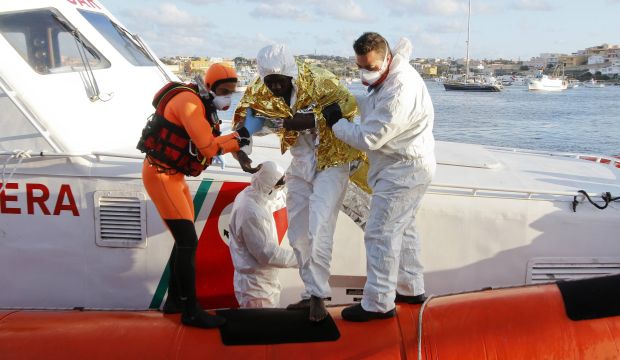
A migrant who survived a shipwreck is helped as he arrives with others at the Lampedusa harbor on February 11, 2015. (Reuters/Antonio Parrinello)
Rome, AP—Some 300 migrants who tried to cross the frigid Mediterranean in open, rubber boats, were reported missing Wednesday by survivors as the UN refugee agency and other aid groups sharply criticized the new EU rescue operation as insufficient and costing lives.
The suspected deaths add to the 29 reported earlier in the week by the Italian coast guard, which said those victims had died of hypothermia during the voyage that began over the weekend in Libya, where most smuggling operations originate.
The UN High Commissioner for Refugees said survivors had reported that four boats had left together, without food or water, and that the boats began taking on water almost immediately. Some 107 people had been rescued by the Italian coast guard and a merchant ship. The agency’s spokeswoman in Italy, Carlotta Sami, said the victims had been “swallowed up by the waves,” the youngest a child of 12.
The nationalities of the survivors and those missing were not immediately given, but a large proportion of those arriving at the moment are fleeing conflicts in Iraq, Syria, Mali and elsewhere.
UNHCR, Save the Children, Amnesty International and other aid groups blasted the new EU-backed rescue patrol as insufficient for the task at hand. The European Union took over Mediterranean patrols after Italy phased out its robust Mare Nostrum operation in November. Mare Nostrum (Our Seas) had been launched in 2013 after 360 migrants drowned off the coast of the Sicilian island of Lampedusa.
But the EU’s Triton mission only operates a few miles off Europe’s coast—its job is to patrol Europe’s borders—whereas Mare Nostrum patrols took Italian rescue ships up close to Libya’s coast.
“The Triton operation doesn’t have as its principal mandate saving human lives, and thus cannot be the response that is urgently needed,” Laurens Jolles, the head of the UN agency for southern Europe, said in a statement.
Save The Children called for the EU to urgently meet to restart Mare Nostrum “or another rescue system that has the mandate, the capacity and means to prevent other tragedies.”
The spokeswoman for the European Commission, Natasha Bertaud, said the Triton operation operated by the EU’s Frontex border agency cannot possibly do the job with Frontex’s 90-million-euro (101.67 million US dollars) total annual budget. Mare Nostrum, which just patrolled the southern Mediterranean, cost Italy 9.5 million euros a month to operate.
“Pointing fingers is not going to get us anywhere,” Bertaud said in Brussels. “If we want to talk seriously about improving the situation then we also need to talk about financing it adequately.”
The commission is currently conducting a feasibility study into whether a border guard system would be worthwhile, with the first discussions expected to begin next month.
The UN and other rescue organizations have long said the EU mission would result in lost lives since the patrols are so far from Libya’s coast. Critics of Mare Nostrum, though, had said the Italian patrols so close to Libya only encouraged migrants to take the risk.
The UNHCHR says the recent deaths confirm that there is no deterrent effect from a less-robust operation. In January, 3,528 migrants reached Italy, up by two-thirds from 2,171 in the first month of 2014, a year that brought 170,100 migrants to Italy’s shores.
Italian Foreign Minister Paolo Gentiloni, speaking on Sky TG24, said the aim should be to “Europeanize” the Mare Nostrum operation and “not take a step back in our humanitarian commitment or ability to confront the problem.”
In his weekly general audience Wednesday, Pope Francis called for more solidarity “so that no one is left without the necessary rescue.”
